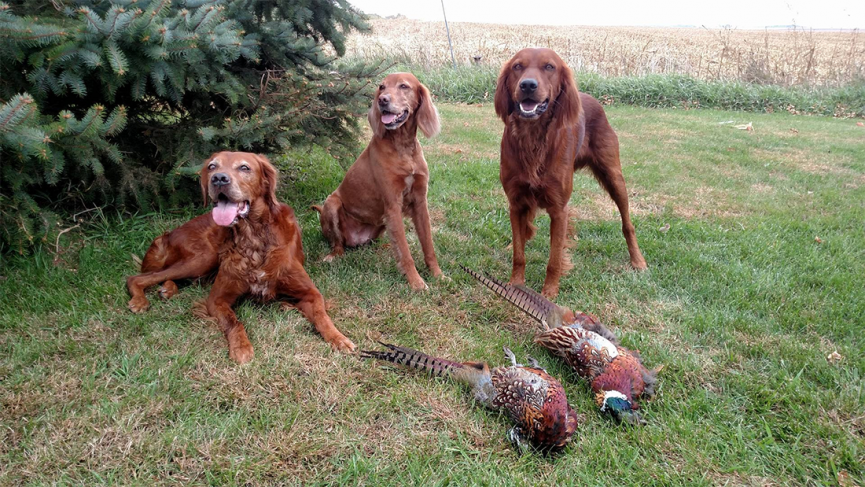By: Amy Gauthier
So you want to train a bird dog. Congratulations! You are interested in an activity that will teach you more about yourself than almost any other hobby. As I sat down, attempting to produce my first dog training article, my head began to spin. So many questions are asked by hopeful new puppy owners:
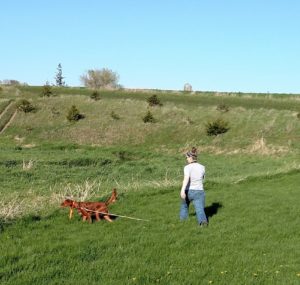
Author on a training exercise w/one of her own
Where do I start? What do I need? What do I DO? Ah, the articles that could be written to answer these questions…and they have been written, in magazines, and books galore. Who am I to add to these experts? I walked away from the computer, for quite a while. I have been training my hunting dogs for the past 13 years. As I look back, I have had some great successes. However, I also see many mistakes, and know that very often my dogs have progressed in training in spite of me. All of these mistakes can be summarized in one phrase: communication breakdown. What I have learned is that the only way to avoid communication breakdown, is to break down your communication. This takes practice. By the time you start to master communicating with your canine, you suddenly realize that you now think like a dog more than a human! Don’t worry, this is also where you begin to understand yourself more…as a person.
“There are many layers to successful dog training but, as I mentioned, communication is key”
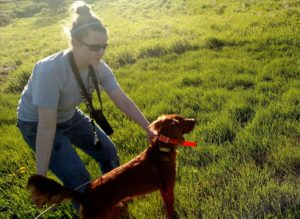
I recently ran across a video honoring the 90th birthday of renowned gun dog trainer Delmar Smith. One quote in this video hit the nail on the head, “He (Delmar Smith) was ahead of his time in that the dog’s mind is the primary focus.” The first step in communicating with a dog’s mind does not come from words, but from body language…some we are conscience of, some we are not, some are physical, some are chemical, but dogs pick up on ALL of it. The words you will eventually use only support this silent communication. There are many books written by excellent trainers that you should read to build your “tool belt” of training methods. However because of body language, before you use any method you need to know your mindset.
In between my organized training sessions, our setters live in our home. Several years ago, my youngest setter at the time was having an indoor energy burst. He proceeded to take a running leap over the couch, on which I was seated, narrowly missing my head! As an “experienced” dog trainer at that time, I had at least learned that patience is a virtue. So, I gritted my teeth to suppress my irritation.
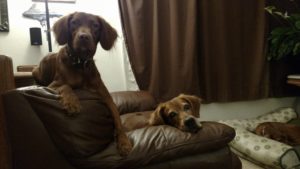
Two members of author’s family waiting for their next command. Aka: communication
My teeth slipped from their clenched position, instantly chipping one of them. I became startlingly aware that I had not controlled my irritation; I had just projected it onto my teeth! If this emotion was outwardly projected in this way, what was happening inwardly? The dog can sense it all. This changed my mindset towards training. If I was too lazy to deal with an unwanted behavior before it got out of hand, or to better communicate wanted behavior, then there is no reason to let a dog push my buttons. If I am not focused in the house, give them some time in their crate. If I don’t have control of training in the yard, or in the field, then put them up and figure out where I went wrong in communication and go back to that point in training tomorrow. My church taught me self-examination; my dogs help me put it into practice. My dogs taught me patience, and continually remind me to use it!
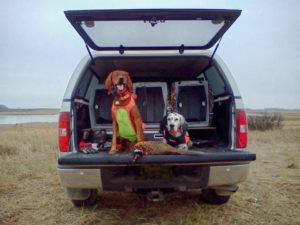 The average person hates to admit that a dog’s mind is a complicated thing; meanwhile a dog trainer loves to admit it because that is what keeps us coming back for more, trying to figure out the puzzle that is the mind of each individual dog. Just be sure to make your pup’s mind the primary focus whether developing your own training plan, or picking up a newly trained dog from the professional trainer. Take a hold of your unconscious body language and turn it into conscious and productive training for your future hunting buddy, and family companion. Most of all don’t be afraid to learn something about yourself along the way!
The average person hates to admit that a dog’s mind is a complicated thing; meanwhile a dog trainer loves to admit it because that is what keeps us coming back for more, trying to figure out the puzzle that is the mind of each individual dog. Just be sure to make your pup’s mind the primary focus whether developing your own training plan, or picking up a newly trained dog from the professional trainer. Take a hold of your unconscious body language and turn it into conscious and productive training for your future hunting buddy, and family companion. Most of all don’t be afraid to learn something about yourself along the way!
- My Fascination With The Outdoors - October 3, 2022
- Confessions Of An Amateur Dog Trainer:A NOT So Tough Nut To Crack - October 15, 2017
- So You Want To Train A Bird Dog? - January 26, 2017

